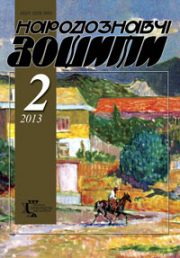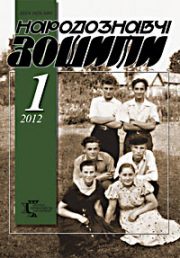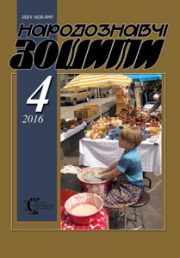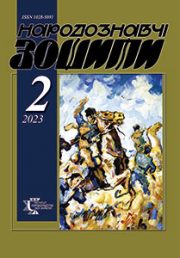The Ethnology Notebooks. 2019, 2 (146), 481—491
UDK 39(=161.2:438:71)
DOI https://doi.org/10.15407/nz2019.02.481
UKRAINIANS FROM POLAND IN CANADA: BETWEEN UKRAINIAN AND POLISH DIASPORAS
TRZESZCZYСSKA Patrycja
ORCID ID: https://orcid.org/0000-0002-5430-243X
PhD in Ethnology, Assistant professor
Institute of Ethnology and Cultural Anthropology
of Jagiellonian University in Cracow, Poland,
9 Golebia Street, 31-007 Cracow
Contacts: e-mail: patrycja.trzeszczynska@gmail.com
Abstract. The Ukrainian diaspora in Canada is a general term concerning the population of Ukrainian origin living in this country. However, the diaspora is not a monolith and consists of many different groups of migrants (from Ukraine, from former Yugoslavia, from Poland) and people whose ancestors settled in Canada (pioneers, emigration of the interwar period, DP). Immigrants from Ukraine who has been coming to Canada in recent years, dynamize cultural processes in the diaspora and the question of the past and cultural boundaries of individual groups, therefore the Ukrainian diaspora research is relevant and necessary. To this day, Ukrainian immigrants from Poland have not received the attention of researchers.
The article is based on materials from ethnographic field research conducted in Canada since 2014 among the people of Ukrainian origin who left Poland in the 1980s. The author used the methods typical for socio-cultural anthropology: interviews and participant observation. Immigrants got to the Ukrainian diaspora, well organized and operating an established discourse on the past, where there is no place for the local history of Ukrainians from Poland. The author’s purpose in this article is to discuss the connection between cultural memory and migration, as well as the fact that memory distinguishes the Ukrainian community from Poland from other groups that form the Ukrainian diaspora in Canada. The memory of Ukrainians from Poland is closely related to their migration and examining it provides knowledge about their identity ambiguity, modification and manipulation of belonging to particular communities within the Ukrainian and Polish diasporas. The author also analyzes the role and significance of Poland and Ukraine in their lives, their involvement in the wider Ukrainian context in Canada, ties with the local Polish community, problems with unambiguous identity assignment, and a specific group distinction. The aforementioned distinction is a challenge for the diaspora in the sense of a homogeneous and closed group. In return, the author proposes to consider the Ukrainian diaspora as a transnational imagined community in accordance with the theoretical proposal of M. Sцkefeld, and to follow the attitudes, practices and ideas of both the diaspora and of the native country, as inspired by R. Brubaker.
Keywords: memory, diaspora, homeland, Ukrainians from Poland, Canadians of Ukrainian origin, Canada.
Received 15.02.2019
REFERENCES
Martynowych O. (1991). Ukrainians in Canada. The formative years 1891-1924. Edmonton: Ca-nadian Institute of Ukrainian Studies.
Luciuk L.Y. (2000). Searching for Place: Ukrainian Displaced Persons, Canada, and the Migration of Memory. Toronto: University of Toronto Press.
https://doi.org/10.3138/9781442679672
Hrycak J. (2000). History of Ukraine: 1772-1999. The Birth of Modern Nation, trans. K. Kotyсska. Lublin: Institute for East-Central Europe [in Polish].
Іvаnek М. (2011). I ne v doma, I ne chyzhyni. Emigratsiya ukrayintsiv z Pol’shchi u 80-kh rokakh. Ukrayinskyy al’manakh (pp. 240-246). Warsaw: Ukrainian Association in Poland [in Ukrainian].
Quayson A. (2013). Introduction – Diaspora and Transnationalism. In A Companion to Diaspora and Transnationalism (pp. 1-26). Oxford; UK: Wiley-Blackwell.
https://doi.org/10.1002/9781118320792.ch1
Clifford J. (1994). Diasporas. Cultural Anthropology (Vol. 9, № 3, pp. 302-338). Arlington, VA: American Anthropological Association.
https://doi.org/10.1525/can.1994.9.3.02a00040
Clifford J. (1997). Routes: Travel and Translation in the Late Twentieth Century. Cambridge; MA: Harvard University Press.
Brubaker R. (2005). The «diaspora» diaspora. Ethnic and Racial Studies (Vol. 28, № 1, pp. 1-19). Guildford; UK: University of Surrey.
https://doi.org/10.1080/0141987042000289997
Creet J. (2011). Introduction: The Migration of Memory and Memories of Migration. In Memory and Migration. Multidisciplinary Approaches to Memory Studies (pp. 3-26), Toronto: University of Toronto Press.
Beck U. (2004). Cosmopolitical realism: on the distinction between cosmopolitanism in philosophy and the social science. Global Networks (Vol. 4, Issue 2, pp. 131-156). Oxford; UK: Oxford University Press.
https://doi.org/10.1111/j.1471-0374.2004.00084.x
Posern-Zieliсski A. (2011). The Concept of Diaspora and Problemns with its Application in Research on ‘Polonia’ communities. In. Poles beyond the State Borders. Various Faces of the Polish Identity (pp. 23-34). Wrocіaw: Polish Ethnological Society [in Polish].
Sцkefeld M. (2006). Mobilizing in Transnational Space: A Social Movement Approach to the For-mation of Diaspora. Global Networks (Vol. 6, № 3, pp. 265-284). Oxford; UK: Oxford University Press.
https://doi.org/10.1111/j.1471-0374.2006.00144.x
Trzeszczyсska P. (2019). Diaspora, Memory, and Places. Ukrainians from Poland of 1980s. in Canada. Ethnographic study. Krakуw: Jagiellonian University Press [in Polish].
Trzeszczyсska P. (2017). A Diaspora within a Diaspora: Ukrainians from Poland in Toronto. An Outline of the Anthropology of Memory. Migration Studies – Review of Polish Diaspora (Vol. 43, Issue. 1, pp. 133-147). Krakуw: Faculty of International and Political Studies & Polish Academy of Sciences [in Polish].
Trzeszczyсska P. (2014). «We Go to Poland, Because We’ve Got Our Memories There»: about Memory of Ukrainians from Poland in Canada. Fieldwork Report. Ethnographic Works (Vol. 42, Issue 3, pp. 257-278). Krakуw: Jagiellonian University Press [in Polish].
Trzeszczyсska P. (2018). Diaspora, homelands and memory in lives of Ukrainian migrants from Poland in Canada. Ethnographic Works (Vol. 46. Issue 3). Krakуw: Jagiellonian University Press (in press) [in Polish].
Ossowski S. (1967). Sociological Analysis of the Notion of Homeland In Ossowski S. From Social Psychology Issues (pp. 201-227). Warsaw: State Sciectific Press [in Polish].
Appadurai A. (2005). Modernity at Large: Cultural Dimensions of Globalization, trans. Z. Pucek. Krakуw: Universitas [in Polish].
Lainer-Vos D. (2010). Diaspora-Homeland Relations as a Framework to Examine Nation-Building Processes. Sociology Compass (Vol. 4, № 10, pp. 894-908).
https://doi.org/10.1111/j.1751-9020.2010.00321.x







